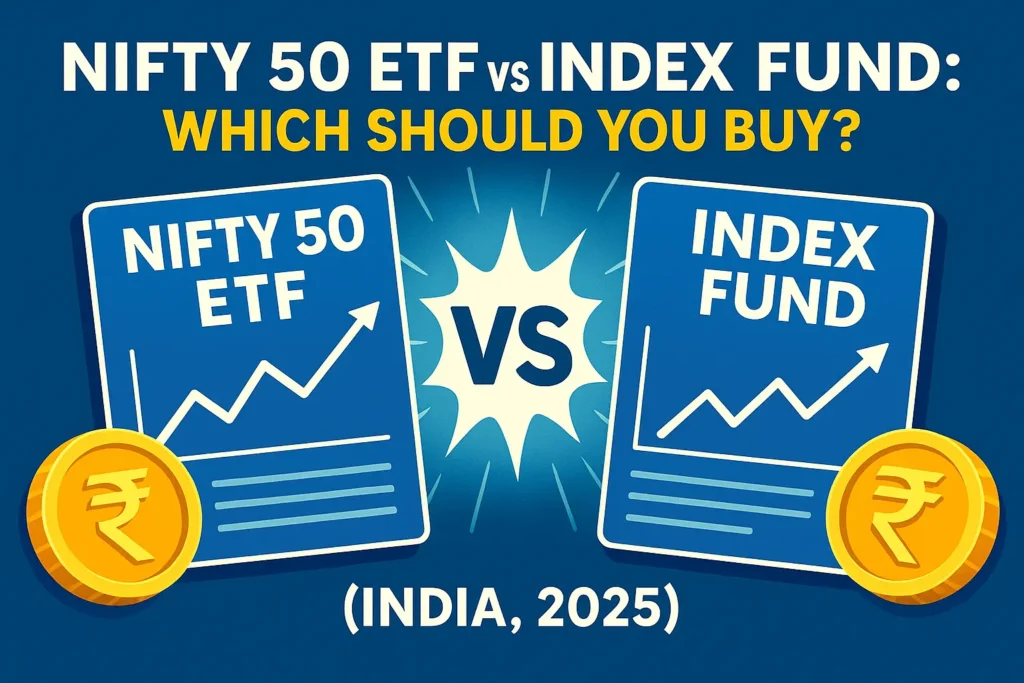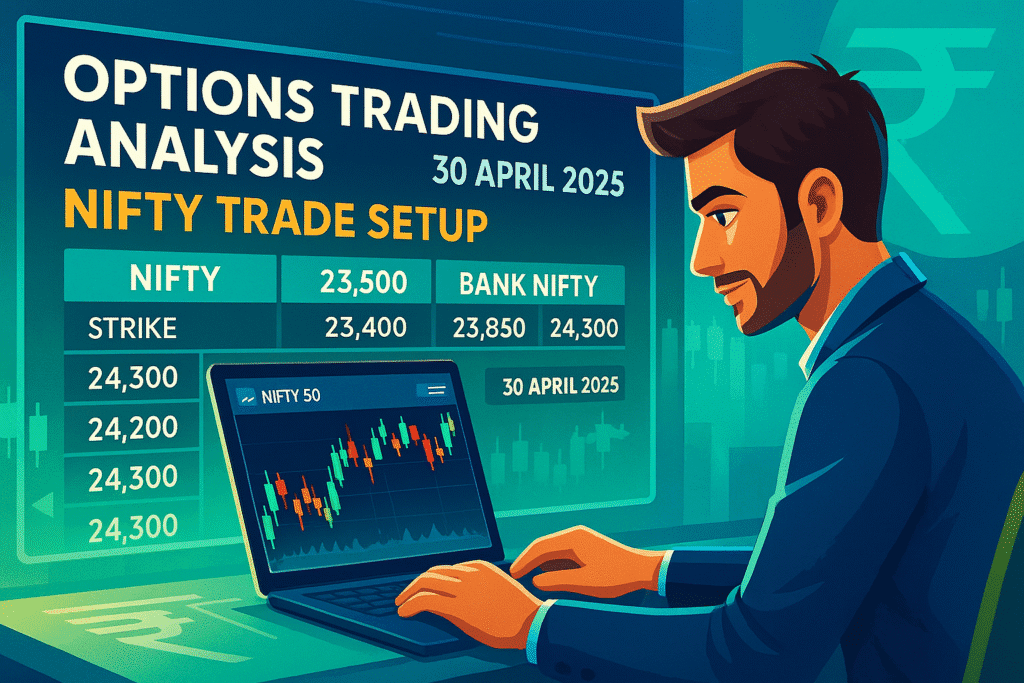Nifty 50 ETF vs Index Fund: Which Should You Buy?
Disclaimer: This article is for educational purposes only. It is not financial advice. For personalized guidance, consult a SEBI-registered investment adviser. Bank rates, terms, and tax rules may change – verify key details before taking any action.

Both the Nifty 50 ETF and Index Fund follow Nifty 50. So technically the return on investment (ROI) may be same. But how you buy, transaction cost, tax handling and how disciplined you are matter the most.
Nifty 50 Index Fund
- Think of it like a mutual fund that follows the Nifty 50.
- You give money to the fund; the fund buys the same 50 big Indian stocks in the same proportions as the index.
- You don’t need a Demat account. You can invest from any MF app/AMC website.
- Your buy/sell happens at the end-of-day NAV (one price for everyone that day).
- Great for automatic SIPs, small amounts (₹500/₹1,000), and “set-and-forget” investing.
When it fits you:
If you are a beginner and do not want to learn stock market but still you want to invest then Nifty 50 Index Fund is on top priority.
Nifty 50 ETF
- An ETF is like a basket of the same 50 stocks—but it trades on NSE/BSE like a single share.
- You need a Demat + broker.
- You can buy/sell any time during market hours at the current market price (which can be a bit above/below its true value).
- Besides the fund’s yearly fee, you may pay brokerage + small “bid-ask spread” each trade.
When it fits you:
You already use a Demat account, want intraday control (limit orders, timing), and are okay placing smart orders to keep costs low.
What’s the actual difference?
- Index Fund: a mutual fund you buy at end-of-day NAV; no Demat needed. Simple SIPs.
- ETF: trades like a stock all day on NSE/BSE; you need Demat + broker; price = market + bid-ask spread.
Cost layers you can’t ignore
| Cost | Index Fund | ETF |
|---|---|---|
| Expense ratio (TER) | Low (direct plans) | Often lower than index funds |
| Brokerage + STT | None on buy/sell | Yes on each trade |
| Bid-ask spread / impact cost | None (you buy at NAV) | Real—widens at open/close/illiquid ticks |
| SIP friction | Native SIP easy | Broker SIP/auto-orders; execution at market price |
Why this matters: Many ETF articles skip spread/impact cost—that’s real money. Spreads are typically tighter mid-day and on liquid indices like Nifty 50, but they do exist.
Tracking error & tracking difference
- Tracking error (TE) = volatility of return gaps vs index; tracking difference (TD) = average under/over-performance vs index after fees. SEBI has a framework; AMFI publishes TE/TD data by fund house.
- Don’t assume high AUM = easy retail liquidity; a lot of Nifty ETF AUM is institutional (EPFO), not retail turnover.
Taxes in 2025
- LTCG: exemption up to ₹1.25 lakh FY 2024-25; above that, ~12.5% (no indexation).
- STCG: 20% post July 23, 2024 (was 15% earlier)—check your dates and regime.
- (Note: tax rules evolve; verify before acting.)
Who should buy what
- Pick an Index Fund if you want…
- Hands-off SIPs with ₹500–₹5,000 tickets, no Demat, zero spread anxiety.
- Predictable execution at NAV, easy STP/SWP with other funds.
- Pick a Nifty 50 ETF if you want…
- Intraday control, laddered buys, limit orders, and already have Demat.
- Rock-bottom TER and you trade smart (mid-day, limit orders) to minimize spread/impact cost.
Practical tips (so you don’t overpay)
- For ETFs: avoid first/last 15 minutes; use limit orders; prefer funds with tighter historical spreads & active market makers.
- For index funds: choose Direct Plan + low TER; compare TE/TD on AMFI’s page before finalizing.
In short
For most first-time Indian investors building a long-term core, a Direct Plan Nifty 50 Index Fund (SIP) is simplest and hard to mess up. If you’re already comfortable with Demat and order types, a liquid Nifty 50 ETF can be fractionally cheaper—if you handle spread + brokerage well. (Even big ETF AUM can be institution-heavy, so judge by spread/volumes, not AUM alone.)
Frequently Asked Questions (FAQs)
Do I need a Demat for index funds?
No. Index funds are mutual funds; you can invest via AMC or platforms without a Demat.
Why do my ETF returns differ from the index?
Expense ratio, tracking error/difference, and trading costs (spread, brokerage) create small gaps.
Are ETFs always cheaper than index funds?
Not always after accounting for brokerage + spread. Index funds (Direct) can be competitive for SIP investors.
What time should I buy an ETF?
Avoid open/close; trade mid-day with limit orders for tighter spreads
What taxes apply in 2025?
Equity-oriented units: LTCG exemption ₹1.25L, LTCG ~12.5% above that; STCG 20% post Jul 23, 2024 (rules can change—verify).

